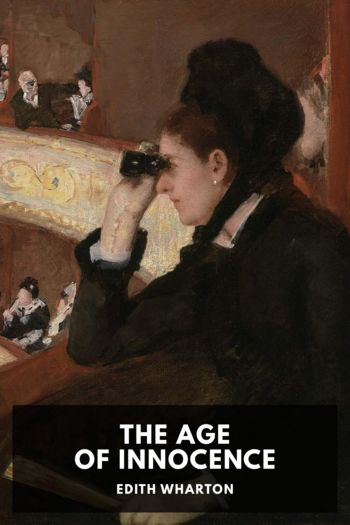The Age of Innocence, Edith Wharton [best 7 inch ereader txt] 📗

- Author: Edith Wharton
Book online «The Age of Innocence, Edith Wharton [best 7 inch ereader txt] 📗». Author Edith Wharton
Archer looked at him with startled eyes. New York, for a young man who had frequented the Goncourts and Flaubert, and who thought the life of ideas the only one worth living! He continued to stare at M. Rivière perplexedly, wondering how to tell him that his very superiorities and advantages would be the surest hindrance to success.
“New York—New York—but must it be especially New York?” he stammered, utterly unable to imagine what lucrative opening his native city could offer to a young man to whom good conversation appeared to be the only necessity.
A sudden flush rose under M. Rivière’s sallow skin. “I—I thought it your metropolis: is not the intellectual life more active there?” he rejoined; then, as if fearing to give his hearer the impression of having asked a favour, he went on hastily: “One throws out random suggestions—more to one’s self than to others. In reality, I see no immediate prospect—” and rising from his seat he added, without a trace of constraint: “But Mrs. Carfry will think that I ought to be taking you upstairs.”
During the homeward drive Archer pondered deeply on this episode. His hour with M. Rivière had put new air into his lungs, and his first impulse had been to invite him to dine the next day; but he was beginning to understand why married men did not always immediately yield to their first impulses.
“That young tutor is an interesting fellow: we had some awfully good talk after dinner about books and things,” he threw out tentatively in the hansom.
May roused herself from one of the dreamy silences into which he had read so many meanings before six months of marriage had given him the key to them.
“The little Frenchman? Wasn’t he dreadfully common?” she questioned coldly; and he guessed that she nursed a secret disappointment at having been invited out in London to meet a clergyman and a French tutor. The disappointment was not occasioned by the sentiment ordinarily defined as snobbishness, but by old New York’s sense of what was due to it when it risked its dignity in foreign lands. If May’s parents had entertained the Carfrys in Fifth Avenue they would have offered them something more substantial than a parson and a schoolmaster.
But Archer was on edge, and took her up.
“Common—common where?” he queried; and she returned with unusual readiness: “Why, I should say anywhere but in his schoolroom. Those people are always awkward in society. But then,” she added disarmingly, “I suppose I shouldn’t have known if he was clever.”
Archer disliked her use of the word “clever” almost as much as her use of the word “common”; but he was beginning to fear his tendency to dwell on the things he disliked in her. After all, her point of view had always been the same. It was that of all the people he had grown up among, and he had always regarded it as necessary but negligible. Until a few months ago he had never known a “nice” woman who looked at life differently; and if a man married it must necessarily be among the nice.
“Ah—then I won’t ask him to dine!” he concluded with a laugh; and May echoed, bewildered: “Goodness—ask the Carfrys’ tutor?”
“Well, not on the same day with the Carfrys, if you prefer I shouldn’t. But I did rather want another talk with him. He’s looking for a job in New York.”
Her surprise increased with her indifference: he almost fancied that she suspected him of being tainted with “foreignness.”
“A job in New York? What sort of a job? People don’t have French tutors: what does he want to do?”
“Chiefly to enjoy good conversation, I understand,” her husband retorted perversely; and she broke into an appreciative laugh. “Oh, Newland, how funny! Isn’t that French?”
On the whole, he was glad to have the matter settled for him by her refusing to take seriously his wish to invite M. Rivière. Another after-dinner talk would have made it difficult to avoid the question of New York; and the more Archer considered it the less he was able to fit M. Rivière into any conceivable picture of New York as he knew it.
He perceived with a flash of chilling insight that in future many problems would be thus negatively solved for him; but as he paid the hansom and followed his wife’s long train into the house he took refuge in the comforting platitude that the first six months were always the most difficult in marriage. “After that I suppose we shall have pretty nearly finished rubbing off each other’s angles,” he reflected; but the worst of it was that May’s pressure was already bearing on the very angles whose sharpness he most wanted to keep.
XXIThe small bright lawn stretched away smoothly to the big bright sea.
The turf was hemmed with an edge of scarlet geranium and coleus, and cast-iron vases painted in chocolate colour, standing at intervals along the winding path that led to the sea, looped their garlands of petunia and ivy geranium above the neatly raked gravel.
Half way between the edge of the cliff and the square wooden house (which was also chocolate-coloured, but with the tin roof of the verandah striped





Comments (0)